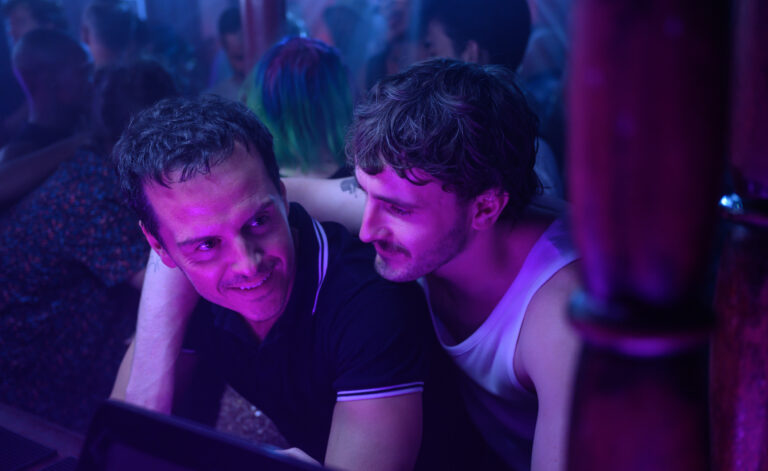All of Us Strangers (2023 | UK | 105 minutes | Andrew Haigh)
It’s by no means A Christmas Carol, but in the grand tradition of holiday movies featuring spiritual visitations, Andrew Haigh works through familiar queer traumas in All of Us Strangers, his gorgeously realized vibey ghost story that arrives in wide release just in time for the holidays. Based loosely on Taichi Yamada’s 1987 novel Strangers, the film is set in a sparsely-occupied newly constructed London highrise. As Adam, a lonely and damaged screenwriter revisiting unresolved issues stemming from the untimely death of his parents, Andrew Scott gives a fantastically mercurial turn in one of the year’s finest performances.
One key to untangling his knotted heart is a fledgling flirtation with one of the spectral building’s few other residents: a shaggily alluring Paul Mescal as Harry, who’s nursing his own aches, demons, and longings. The other piece is an inexplicable supernatural rift that allows him to repeatedly travel back to his childhood home and converse with his long-dead parents. The heartrending film sparkles with magic realism paired with a nonplussed British acceptance of the sudden presence of ghosts (Claire Foy and Jamie Bell, rocking eighties attitudes and looks) who await the beck and call of a simple commuter rail journey.
The film is on many levels a queer wish fulfillment, but it’s easy to buy into Haigh’s premise and Scott’s luminous embodiment of a stunted gay man in his mid-forties. His visits to his past allow him to have long overdue conversations he always wanted to have, but was never able to breach, with his parents. Foy and Bell each get Oscar-worthy one-on-one meetings with their grown son that delicately bridge decade’s old attitudes with modern sensibilities. In the present day, Adam and Harry negotiate their own landscape of generational differences and bedrock commonalities in the modern queer experience, while forging a nascent relationship of sex, clubs, and cozy couch times. Jamie D. Ramsay’s cinematography grounds us as the action shifts from the hazy incandescences of Christmases Past, the liminal spectral isolation of a modernist glass tower, to the throbbing lights and retro playlists of druggy nights in city bars.
The otherworldliness of these visitations makes for an incredible sleight of hand on Haigh’s part, but going along with his semi-autobiographical illusion with wide-ranging rewards. The pull to the past may not be altogether healthy, but it does give Adam Scott an outstanding showcase, including the opportunity to give one of the most sweetly bizarre performances of an anxious little boy Christmas Eve in recent memory. The scene — shot in Haigh’s actual childhood home — sparkles with both wonder, fear, and hilarious juxtapositions. While Adam gets the ultimate package of therapy sessions (and gets to kiss Paul Mescal), we get to witness conversations that sink their enduring claws into our hearts, too. After its premiere at Telluride, All of Us Strangers was the film and it’s ending in particular, was what everyone most wanted to talk about in gondolas, at parties, or in line for other movies, often in hushed tones to avoid spoilers from those yet to see it. Although there were many interpretations, almost everyone (and the sniffles in the audience as the credits rolled) agreed that it was deeply and emotionally effective and bound to linger for a long time.
All of Us Strangers arrives in select theaters this week; it has an local engagement at SIFF Egyptian beginning January 4th.
A previous version of this review appeared as part of our coverage of the 50th Telluride Film Festival, where All of Us Strangers had its world premiere.



